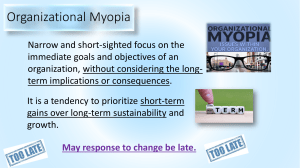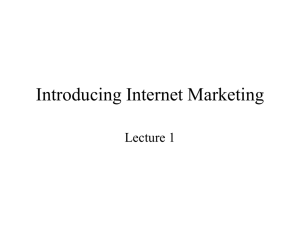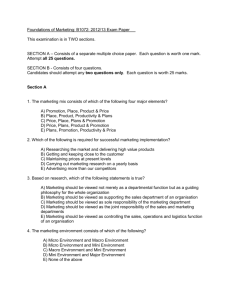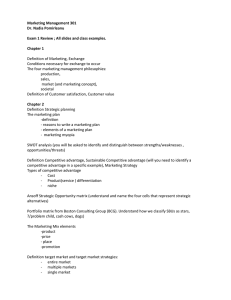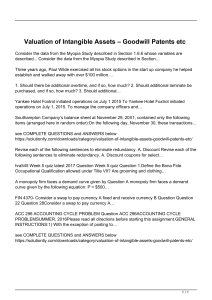Marketing Concept vs. Myopia: Understanding the Relationship
advertisement
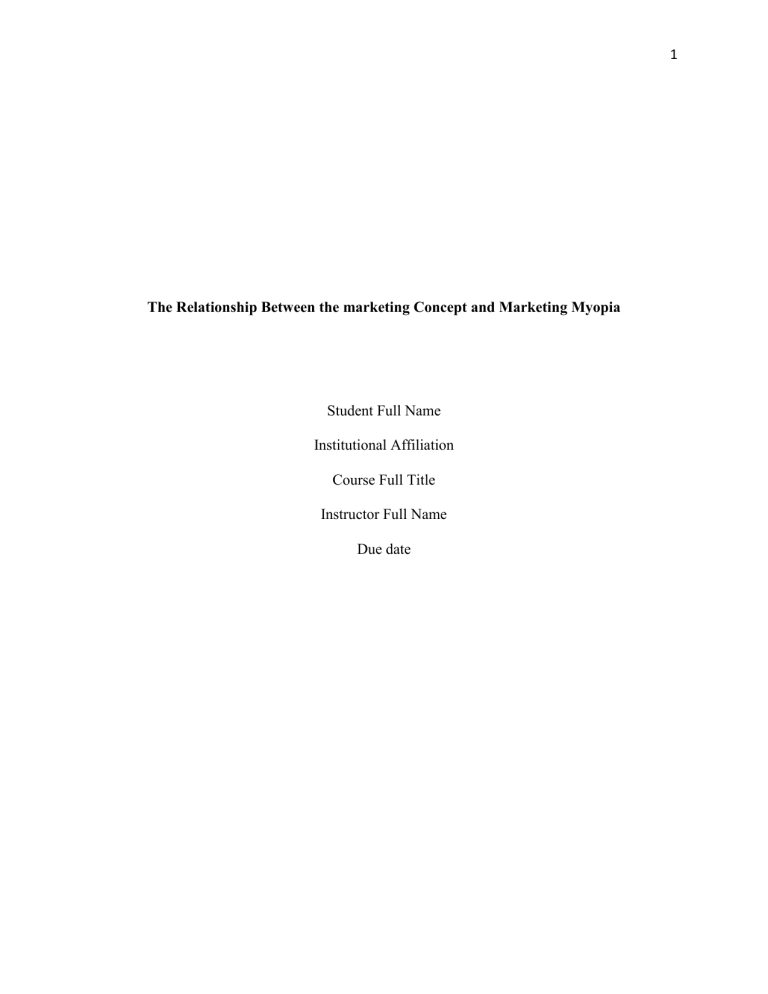
1 The Relationship Between the marketing Concept and Marketing Myopia Student Full Name Institutional Affiliation Course Full Title Instructor Full Name Due date 2 The Relationship Between the marketing Concept and Marketing Myopia The success of a business depends highly on the organization’s capacity to effectively recognize and serve the needs of its customers. According to Kamasastry (2020), essential factors to the success of a business include management, marketing, and human resources, among other factors. Although all these factors are essential, marketing is crucial as it influences the firm’s competitive advantage. The use of marketing data to formulate strategies is engraved in the marketing concept, while the shortsightedness focus on production capacities and internal growth are centered on marketing myopia. This essay will analyze the marketing concept and marketing myopia to highlight the relationship between the two concepts. The Marketing Concept The marketing concept is a business philosophy which holds that the key to achieving organizational success lies in creating, delivering, and communicating customer value. This concept prioritizes the needs of the buyer rather than the seller as it is preoccupied with the idea of satisfying these needs (Tadajewski, 2018). This philosophy represents a major drift in today’s company orientation that provides the foundation for firms to gain a competitive advantage. To adopt the marketing concept, organizations have to take strategic steps to gain as much information as possible regarding the consumer (Tadajewski, 2018). The organization should then make marketing, product, and even strategy decisions based on the information gathered. Therefore, organizations that adopt this concept begins with the customer needs and work their way backward in order to create value instead of starting with some other factors such as production. Apple and Chick-fil-A are major examples of organizations that employ the marketing concept. 3 Marketing Myopia Contrary to the marketing concept, marketing myopia occurs when all principles of the marketing concept are ignored, disregarded, or inadequately implemented. It arises when an organization puts too much effort and concentration on the manufacture of the product rather than focusing on what the client needs. The theory was formulated by Theodore Levitt, who observed that companies tie business success to the capacity to produce their products and services in large quantities (Gallo, 2016). Levitt observed that the concept is wrong and more effective to adopt a customer-centric mindset. This means that organizations that ignore the marketing concept risk facing the negative effects of marketing myopia and ultimately failing. The relationship between these two concepts is simple since the failure of an organization to follow the marketing concept results in marketing myopia. The marketing concept informs the organizational and marketing strategies used by the firm to fulfill the needs and wants of the intended market. It ensures that the company provides high-quality and practical goods and services (Tadajewski, 2018). Contrary to this, marketing myopia refers to the narrow-minded focus that blinds organizations to prioritize quantity over quality. This leads them to concentrate more on the manufacture and marketing of goods and services that have little to no value for their clients (Kamasastry, 2020). An example of marketing myopia is Kodak which lost a large percentage of its shares to Sony cameras for failing to evolve and plan for the boom of digital cameras. Such kinds of firms typically fail as they forget to recognize strong customer relationships as the main driver of business success. 4 References Gallo, A. (2016, August 22). A refresher on marketing myopia. Harvard Business Review. Retrieved February 5, 2022, from https://hbr.org/2016/08/a-refresher-on-marketingmyopia Kamasastry, P. (2020). Marketing Myopia–A Literature Review Based Contemporary Perspective. Journal of Marketing Vistas, 10(2), 44-59. Tadajewski, M. (2018). Critical reflections on the marketing concept and consumer sovereignty. Routledge. https://doi.org/10.4324/9781315630526-12


